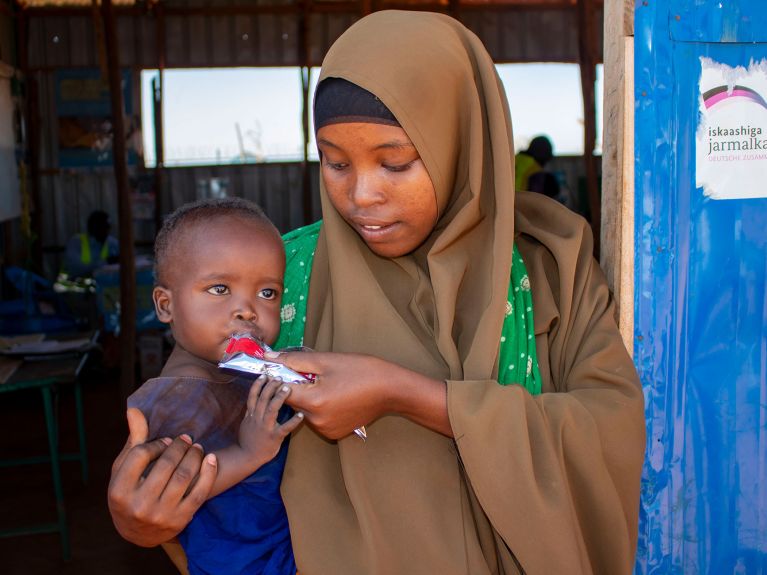Alleviating crises around the world
Germany provides humanitarian aid to support millions of people, including in countries and regions that are not at the centre of media attention.

Germany has been among the world's largest donors of humanitarian assistance for many years. In 2024 the Federal Government made a total of 2.25 billion euros available, making Germany the second largest donor country. Germany's level of commitment remains high, also in 2025: up to the end of July, a total of 889.3 million US dollars were made available for humanitarian projects, and this was in addition to Germany's contributions to the European Union's joint humanitarian aid projects.
Humanitarian aid is focussed on three regions
The emphasis of German humanitarian aid currently lies on three regions. In the Middle East, Germany has made some 335 million available since October 2023, to assist people in the occupied Palestinian territories, and in particular in Gaza. In mid-July Federal Chancellor Friedrich Merz stated that “what’s happening in the Gaza Strip is no longer acceptable. We are pressing for a ceasefire and comprehensive humanitarian assistance for the people in the region.” In addition to supplying food, medical care and housing, Germany is also involved in humanitarian demining in the Middle East, for example in Gaza and Syria. Supporting Ukraine is a priority in Europe. "Rebuilding Ukraine is not merely a future matter. It cannot wait until the weapons have become silent," Merz stressed after the Ukraine Recovery Conference that took place in Rome in mid-July. However, Germany is also providing assistance to countries and regions that are no longer at the centre of media attention. About one third of the funds made available go to crisis regions in Africa, such as Sudan, the Democratic Republic of the Congo, South Sudan, Ethiopia, Somalia and Chad.
Close cooperation with international organisations
The Federal Government cooperates closely with the United Nations, including in the World Food Programme, Unicef and the Office for the Coordination of Humanitarian Affairs (OCHA), as well as with the International Committee of the Red Cross and numerous non-governmental organisations. Key areas of activity for which Germany provides support include food security, health care, mine and ordnance clearance, water supply and sanitation, housing, shelter and disaster preparedness. Many projects address multiple areas simultaneously.
Ensuring response to acute emergencies
For its humanitarian aid Germany also relies on pooled funds, which are joint funding instruments by multiple donor countries that can be used flexibly. These enable aid organisations to swiftly respond to acute emergencies, as well as to support people in crises that are attracting less attention.
Protection against sexual and gender-based violence is another focus area. Germany makes a point of funding programmes that are concerned with prevention work and providing survivors with access to medical, psychosocial and legal aid, as well as strengthening local structures. This allows for better protection of especially vulnerable groups, and women and girls in particular. Among other things, Germany made 7 million euros available as core funding for the United Nations Population Fund (UNFPA) between 2022 and 2024. This money is earmarked for projects dedicated to promoting sexual and reproductive health and for reinforcing protection against and prevention of sexual and gender-based violence.
Germany’s international disaster relief
In addition to long-term projects, Germany also provides short-term disaster relief around the world, when existing capacities in the affected countries are insufficient. Such missions are often coordinated at the European level, for instance following flood events, earthquakes and other natural disasters. In spring Germany provided emergency assistance following the earthquake in Myanmar, for example. The German Red Cross' first relief transport to the Asian country comprised 42 tonnes of relief goods. The items delivered included tents, blankets and toiletries, as well as tool kits to help with reconstruction.
Maintaining commitment under difficult conditions
With its "Federal Foreign Office Strategy for Humanitarian Assistance Abroad" that was published in September 2024, Germany aims to effectively and efficiently pursue its commitments also under challenging conditions. Germany remains a central international aid player, despite the fact that tasks are growing while resources are decreasing. Alongside financial support, the Federal Government also takes political action to promote safe access to crisis zones for humanitarian helpers, ensure that international humanitarian law is observed, and arrange for protection and support for particularly vulnerable individuals.


